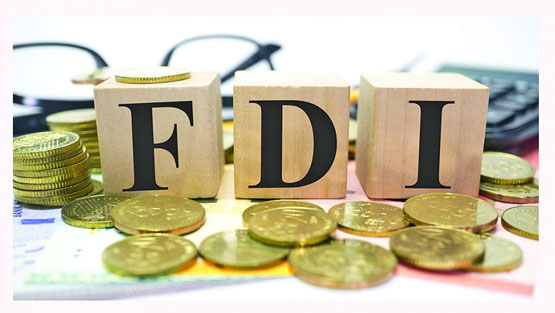Bangladesh needs to strengthen credit capability for FDI
Zarif Mahmud : Despite developing economic zones and adopting one-stop services to attract foreign direct investment (FDI), Bangladesh has failed to get as much as it targeted.
Not only global economic giants like India, even small economies in the South Asian region such as the Maldives and Sri Lanka are ahead of Bangladesh in terms of FDI attraction.
According to UNCTAD’s World Investment Report 2023, Bangladesh ranks fourth among South Asian nations in terms of FDI inflow as a percentage of gross domestic product (GDP) despite being the second-largest economy in the region.
From 2017 to 2022, Bangladesh received an annual average of $2.92 billion in FDI.
In 2022, Maldives received $722 million in FDI, which equated to around 11.70 percent of its GDP. Meanwhile, Sri Lanka, which endured a severe economic crisis in 2022, fetched $898 million from foreign investors, equating to 1.20 percent of its GDP.
While Bangladesh received more FDI than either nation in terms of US dollars, both countries outpaced Bangladesh when considering FDI as a percentage of GDP.
Bangladesh’s FDI inflow amounted to only 0.75 percent of its GDP, according to the UNCTAD report. But even in US dollar amounts, the FDI would amount to less than half of the requirement.
As per ‘Vision 2041’, the government’s plan to turn the nation into an advanced economy by 2041, Bangladesh needs to get FDI equivalent to 1.66 percent of its GDP annually.
This reveals that the nation, which has registered around 6 percent annual economic growth over the past two decades, is failing to create enthusiasm among foreign investors despite taking several steps.
Numerous economic zones were established and the authorities framed a law to provide fast services through one-stop services over the past decade and a half. But the level of FDI did not grow as expected.
This ultimately begs the question: What’s wrong? Why does a $450 billion economy fail to get the desired amount of foreign investment?
One of the major problems is that facilities at the port for handling cargoes and containers, alongside transport and logistic facilities, are not up to the mark, lagging behind facilities developed by Bangladesh’s competitors in South Asia.
To increase foreign direct investment (FDI) in the country, credit quality should be made satisfactory. Favorable environment should be created for credit quality improvement. Many foreign entrepreneurs lost confidence in investing due to lower credit quality. As a result, the desired FDI can’t be achieved.
Domestic and foreign entrepreneurs highlighted these observations in an investment-related seminar, organized by Foreign Investors Chamber of Commerce and Industry (FICCI), an organization of foreign entrepreneurs. It was organized at Westin Hotel in the capital on Monday.
They said that the trade policy of the country needs to be more open. Apart from this, reform initiatives should be taken in all areas related to business environment development and ongoing reform activities should be continued. If the business environment is easy to reform, corruption will also decrease.
Executive Chairman of Investment Development Authority (BIDA) Lokman Hossain was present as the chief guest at the event. Asian Development Bank (ADB) Country Director Edmon Ginting, President of Japan-Bangladesh Chamber of Commerce and Industry (JBCCI) Myung Hu Lee, Chairman of Policy Exchange Bangladesh spoke among others in the seminar. Mashroor Riaz Director of FICC and Chief Executive of HSBC Bank Mahbub ur Rahman moderated the seminar.
In the event, Executive Chairman of Investment Development Authority (BIDA) Lokman Hossain said that Bangladesh can be the most attractive destination for safe profits for foreign entrepreneurs. The government has undertaken many developmental activities including land reform for favorable investment environment. All services and infrastructure including electricity are now readily available. The domestic market of 17 crore people is also very large now. The government is providing all the favorable policy support.
In the discussion, Asian Development Bank (ADB) Country Director EdimonGinting said that before investing in a country, entrepreneurs first look at the credit quality of that country. They see low credit as a weakness. To get FDI, Bangladesh’s credit rating should be increased. In addition to creating a favorable environment for credit quality development, the international credit rating agencies should inform it. He said the business environment needs to be more open and reformed. Regarding corruption, he said that some corruption happens in all ADB member countries. Corruption is especially prevalent in the procurement process. Corruption will be reduced if procurement process and various services are digitized.
Incidentally, last May, the US-based company Moody’s lowered the credit rating of Bangladesh by one step from BA-3 to BA-1. On December 15, another agency, Fitch Ratings, also maintained its credit rating at negative. Earlier last September, they downgraded Bangladesh’s credit rating from ‘stable’ to ‘negative’. However, recently the agency has rated the banking system of Bangladesh from ‘negative’ to ‘stable’. Analysts believe that this will increase the confidence of foreigners in investing in Bangladesh.
Rare Israeli airstrike in Beirut kills Hezbollah commander and more than a dozen others
International Desk: Israel launched a rare airstrike that killed a senior Hezbollah milita…








